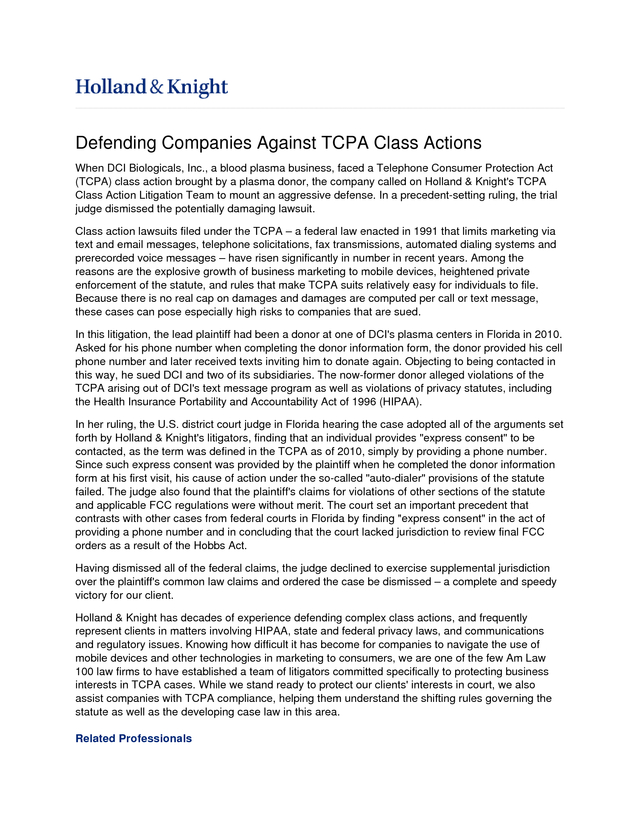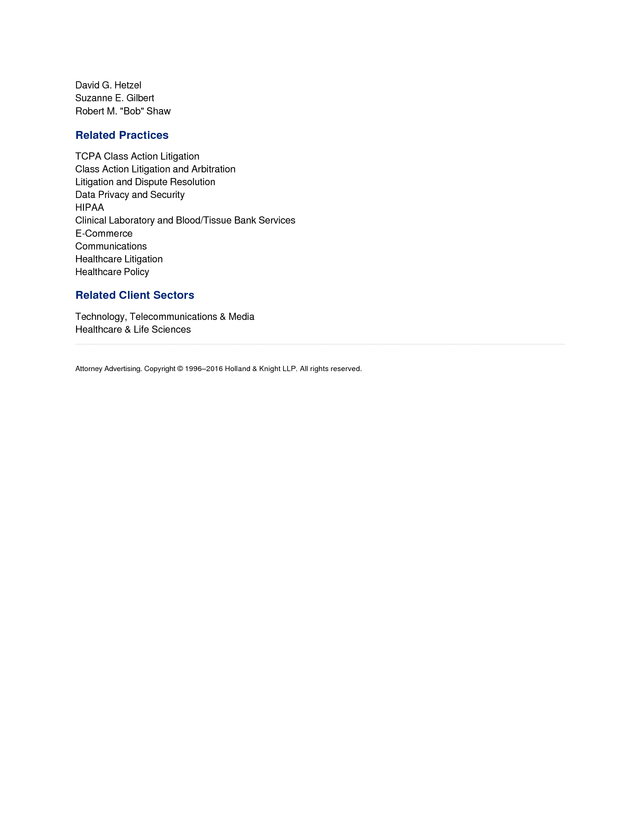Description
Defending Companies Against TCPA Class Actions
When DCI Biologicals, Inc., a blood plasma business, faced a Telephone Consumer Protection Act
(TCPA) class action brought by a plasma donor, the company called on Holland & Knight's TCPA
Class Action Litigation Team to mount an aggressive defense. In a precedent-setting ruling, the trial
judge dismissed the potentially damaging lawsuit.
Class action lawsuits filed under the TCPA – a federal law enacted in 1991 that limits marketing via
text and email messages, telephone solicitations, fax transmissions, automated dialing systems and
prerecorded voice messages – have risen significantly in number in recent years. Among the
reasons are the explosive growth of business marketing to mobile devices, heightened private
enforcement of the statute, and rules that make TCPA suits relatively easy for individuals to file.
Because there is no real cap on damages and damages are computed per call or text message,
these cases can pose especially high risks to companies that are sued.
In this litigation, the lead plaintiff had been a donor at one of DCI's plasma centers in Florida in 2010.
Asked for his phone number when completing the donor information form, the donor provided his cell
phone number and later received texts inviting him to donate again. Objecting to being contacted in
this way, he sued DCI and two of its subsidiaries.
The now-former donor alleged violations of the TCPA arising out of DCI's text message program as well as violations of privacy statutes, including the Health Insurance Portability and Accountability Act of 1996 (HIPAA). In her ruling, the U.S. district court judge in Florida hearing the case adopted all of the arguments set forth by Holland & Knight's litigators, finding that an individual provides "express consent" to be contacted, as the term was defined in the TCPA as of 2010, simply by providing a phone number. Since such express consent was provided by the plaintiff when he completed the donor information form at his first visit, his cause of action under the so-called "auto-dialer" provisions of the statute failed. The judge also found that the plaintiff's claims for violations of other sections of the statute and applicable FCC regulations were without merit.
The court set an important precedent that contrasts with other cases from federal courts in Florida by finding "express consent" in the act of providing a phone number and in concluding that the court lacked jurisdiction to review final FCC orders as a result of the Hobbs Act. Having dismissed all of the federal claims, the judge declined to exercise supplemental jurisdiction over the plaintiff's common law claims and ordered the case be dismissed – a complete and speedy victory for our client. Holland & Knight has decades of experience defending complex class actions, and frequently represent clients in matters involving HIPAA, state and federal privacy laws, and communications and regulatory issues. Knowing how difficult it has become for companies to navigate the use of mobile devices and other technologies in marketing to consumers, we are one of the few Am Law 100 law firms to have established a team of litigators committed specifically to protecting business interests in TCPA cases. While we stand ready to protect our clients' interests in court, we also assist companies with TCPA compliance, helping them understand the shifting rules governing the statute as well as the developing case law in this area. Related Professionals .
David G. Hetzel Suzanne E. Gilbert Robert M. "Bob" Shaw Related Practices TCPA Class Action Litigation Class Action Litigation and Arbitration Litigation and Dispute Resolution Data Privacy and Security HIPAA Clinical Laboratory and Blood/Tissue Bank Services E-Commerce Communications Healthcare Litigation Healthcare Policy Related Client Sectors Technology, Telecommunications & Media Healthcare & Life Sciences Attorney Advertising.
Copyright © 1996–2016 Holland & Knight LLP. All rights reserved. .
The now-former donor alleged violations of the TCPA arising out of DCI's text message program as well as violations of privacy statutes, including the Health Insurance Portability and Accountability Act of 1996 (HIPAA). In her ruling, the U.S. district court judge in Florida hearing the case adopted all of the arguments set forth by Holland & Knight's litigators, finding that an individual provides "express consent" to be contacted, as the term was defined in the TCPA as of 2010, simply by providing a phone number. Since such express consent was provided by the plaintiff when he completed the donor information form at his first visit, his cause of action under the so-called "auto-dialer" provisions of the statute failed. The judge also found that the plaintiff's claims for violations of other sections of the statute and applicable FCC regulations were without merit.
The court set an important precedent that contrasts with other cases from federal courts in Florida by finding "express consent" in the act of providing a phone number and in concluding that the court lacked jurisdiction to review final FCC orders as a result of the Hobbs Act. Having dismissed all of the federal claims, the judge declined to exercise supplemental jurisdiction over the plaintiff's common law claims and ordered the case be dismissed – a complete and speedy victory for our client. Holland & Knight has decades of experience defending complex class actions, and frequently represent clients in matters involving HIPAA, state and federal privacy laws, and communications and regulatory issues. Knowing how difficult it has become for companies to navigate the use of mobile devices and other technologies in marketing to consumers, we are one of the few Am Law 100 law firms to have established a team of litigators committed specifically to protecting business interests in TCPA cases. While we stand ready to protect our clients' interests in court, we also assist companies with TCPA compliance, helping them understand the shifting rules governing the statute as well as the developing case law in this area. Related Professionals .
David G. Hetzel Suzanne E. Gilbert Robert M. "Bob" Shaw Related Practices TCPA Class Action Litigation Class Action Litigation and Arbitration Litigation and Dispute Resolution Data Privacy and Security HIPAA Clinical Laboratory and Blood/Tissue Bank Services E-Commerce Communications Healthcare Litigation Healthcare Policy Related Client Sectors Technology, Telecommunications & Media Healthcare & Life Sciences Attorney Advertising.
Copyright © 1996–2016 Holland & Knight LLP. All rights reserved. .













